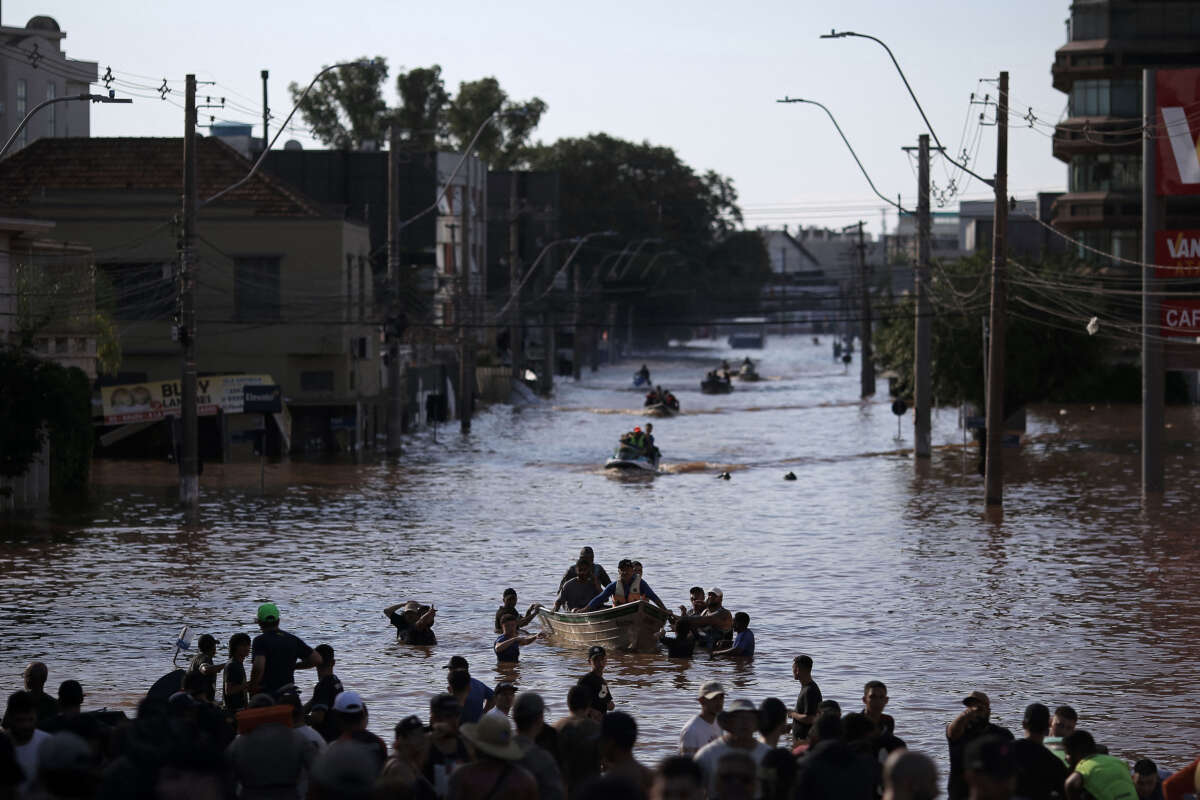Support justice-driven, accurate and transparent news — make a quick donation to Truthout today!
Devastating floods in the south Brazilian state of Rio Grande do Sul have killed dozens of people and displaced thousands more over the past several days, in one of the most catastrophic natural disasters the country has seen in decades.
As of Tuesday evening, 90 people were reported dead in the region, a number that is expected to increase substantially in the coming days. More rain was expected on Tuesday night, further obstructing recovery efforts that have already been slow due to the overwhelming need for shelter, food, hygiene products, and other essentials.
It’s estimated that the floods have displaced more than 150,000 people from their homes, with an additional 50,000 residents living in schools, gymnasiums and other temporary shelters, The Associated Press reported. With overnight temperatures dipping into the 50s, and not enough blankets to go around, the population now faces the possibility of widespread hypothermia.
Access to safe drinking water in the state’s capital city of Porto Alegre is also a problem, with around 80 percent of the city lacking running water due to the floods.
The rain totals over the past week have equaled close to 70 percent of what the region typically sees in the entire month of April. The flooding is the worst Brazil has seen in the past 80 years, and continued storms hitting the region are going to make things “much worse,” Gov. Eduardo Leite said on Friday.
More than 265 municipalities in Rio Grande do Sul have been affected by the floods. In addition to deaths and displacement, 350,000 people have experienced at least some form of property damage.
The flooding is likely to affect the rest of the country, particularly when it comes to food supplies, as Rio Grande do Sul produces around 70 percent of rice for Brazil.
Several scientists have stated outright that two factors are to blame for the floods — the El Niño and La Niña weather patterns for this year, and the effects of human-made global climate change.
Climatologist Francisco Eliseu Aquino has described the two factors as creating a “disastrous cocktail.” Brazilian climate activist Bruon Brezenski has described the devastation wrought by the storms as “a war scene.”
“Of the recent global catastrophes, this is undoubtedly one of the worst,” Brezenski said on X.
“Unprecedented flooding in Brazil is another reminder that climate change is an issue now, not just for future generations,” said Isaias Hernandez, an environmental educator and founder of QueerBrownVegan.
Bárbara Calegari, an evolutionary biologist who was born in Rio Grande do Sul, shared an image of some of the destruction, noting that the floods were clearly more destructive due to climate change.
“This is my hometown in Brazil, submerged by heavy rain. It is absolutely drastic the situation in my State, several people died and many others lost their houses,” Calegari said, adding that it was unbelievable that “some people still don’t believe in climate change.”
Luiza Karpavicius, a Brazilian-born environmental and climate economics Ph.D student at Aarhus University in Denmark, also commented on the flooding.
“The era of extreme climate effects is here,” Karpavicius said. “It’s important to remember that the most affected will continually be the more vulnerable populations, who have historically contributed the least to climate change.”
Press freedom is under attack
As Trump cracks down on political speech, independent media is increasingly necessary.
Truthout produces reporting you won’t see in the mainstream: journalism from the frontlines of global conflict, interviews with grassroots movement leaders, high-quality legal analysis and more.
Our work is possible thanks to reader support. Help Truthout catalyze change and social justice — make a tax-deductible monthly or one-time donation today.
